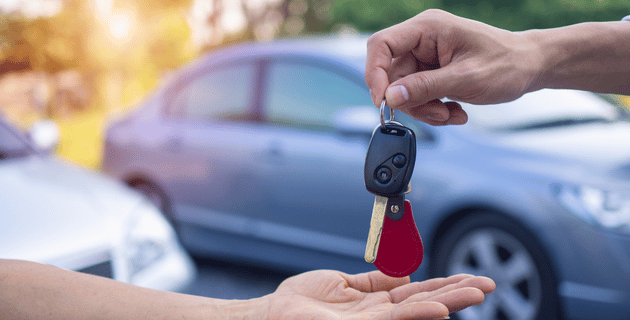You’re home visiting family when your cousin asks to borrow your car. You hesitate because you’re not sure if your insurance covers him. The good news is that it probably does, but the bigger picture is that a lot depends upon your specific policy. Read on to find out what to expect before you encounter this situation in real life.
Vehicle insurance typically follows the car, not the driver.
Your automobile insurance policy covers your car, and that’s the case whether you’re driving it or someone else is driving it. It is your policy that is considered the primary policy if an accident happens. The policy of the driver borrowing your car would be considered excess insurance if it ends up being used at all.
What happens if your friend or relative gets in an accident?
If your friend or relative was at fault, your insurance would cover the accident. Here’s how it would play out.
Liability would help pay for damage to the other car and help pay for the other driver’s and passengers’ medical bills. It will not pay for your friend’s injuries, if any, or for damage to your car.
Collision can pay for your vehicle repairs, once your deductible is met. Collision, however, is an optional coverage (unless you’re leasing or financing the car). Not every policyholder will have collision. If you do not have collision insurance, you will be responsible for the repair and/or replacement of your car out of your own pocket.
Medical payments coverage can help pay the medical bills for your friend or relative if they are injured.
There are some exceptions and extenuating circumstances…
If the accident was so extensive in terms of damage or injuries, it could max out the policy limits. In that case, your friend’s insurance may be asked to cover the remaining amount. If your friend doesn’t have insurance, then you will need to cover the costs out-of-pocket.
Some policies only cover the person named on the policy so there is no coverage if you loan your vehicle to a friend or family member. Other policies provide coverage for friends/relatives on a limited basis. Some policies also don’t cover relatives living in the same house as you who are not already named on the policy. (That’s a good reason to make sure your teen driver is added as soon as he or she is driving.)
Some insurers increase your deductible before they cover an accident if someone other than an authorized driver on the policy is driving your car. Some policies also lower your liability coverage to state minimums if the accident is caused by someone other than a named insured/insured.
If, however, your friend or relative was not at fault, the other driver’s insurance would cover the accident.
Your friend or relative would need to get information from the other driver, including Identifying information like driver’s license number and/or vehicle license plate number. You can also get their name, address, insurer, policy number. An easy way to do this is to take a picture of the other driver’s insurance card, front and back. While you can file a claim with their insurance company, you can always file the claim with your own insurance company and let them start the process. They will subrogate the other company for payment.
If the accident was a hit and run, your policy could cover the costs, subject to your deductible if you carry collision coverage or uninsured motorist property damage.
Before you hand over the keys…
Accidents can be costly, and not only due to repairs and medical expenses. An accident may cause your insurer to raise your rates on your policy for the future, even though you are not the one involved in the accident.
It’s a good idea to know what you’re in for before you say yes to anyone wanting to borrow your car.
- Make sure they have a driver’s license and a good driving record.
- Know whether they have insurance, including collision.
- Read the fine print on your policy or talk to your insurance agent to know what is covered in the event of an accident.
- Decide what portion of the deductible, or any costs, your guest driver will need to pay in case of an accident.
With that information, you’ll be well on your way to making an informed decision about who gets to drive your car this season. Happy holidays!
This article is furnished by California Casualty, providing auto and home insurance to educators, law enforcement officers, firefighters, and nurses. Get a quote at 1.866.704.8614 or www.calcas.com.
- Graduation – When to Remove Your Child from Your Auto Policy - May 18, 2023
- How to Prevent Catalytic Converter Theft - May 17, 2023
- How Much Does Home Insurance Cost? - May 17, 2023

